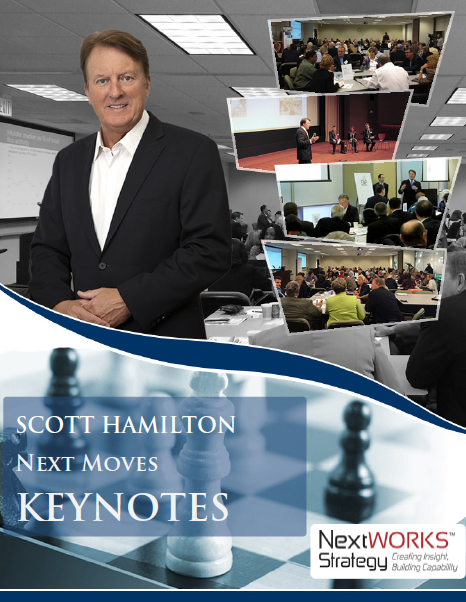In light-speed changing markets, yesterday’s approaches to running a business or applying outdated techniques to contemporary problems will quickly be disrupted. Moving beyond the status quo has never been more important. The Executive Next Practices Institute, a think-tank of hundreds of top executive and thought leaders, has been focused on the concept of “next practices.”
Next practice development isn’t about making something more efficient – it entails a fundamental transformation of the core business culture and model to ensure that all the moving parts of a business are aligned and effective.
Best Practices vs. Next Practices.
- Best practices are past driven – repetitive formulas for tactical business problems.
- Next practices are future-driven strategic solutions that enable you to better anticipate and respond to workplace violence situations.
Next practices represent an enhanced way of looking at issues that have embedded uncertainties, risks and variables.
Key Elements of Building and Understanding Next Practices:
1. The Need: Every organization needs to get past status-quo thinking in order to create transformation and change that will enable it to effectively respond to challenges and obstacles. Standardization of tasks can lead to productivity, but also rigidity.
2. Beyond Best Practices: Conventional best practices tend to be proven, locked-down business techniques that can be re-executed successfully on demand at the middle-management level. There are few best practices for C-level executives who face a constant flow of new challenges, unforeseen problems and marketplace conditions beyond the reach of conventional thinking.
3. Next Practice Intelligence: In place of proven techniques, next practices offer flexible tools, frameworks and situational analysis methods that enable leaders to get a clear view of the current situations they face and frame intelligent responses to it.
4. Moving Parts: The full next practice approach includes policies, practices, behavior models and performance techniques, used in combination with highly collaborative and cross-functional communication between people. Taken as a whole, this approach enables leaders to be exponentially more effective in directing change.
5. Metrics: Next practice techniques and methods are designed to be measurable so their effectiveness can be understood and assessed. Using emerging and leading edge metrics, displayed in non-traditional, visual formats, next practice dashboards forecast results rather than trail in data display.
6. Cross-Functional Focus: Next practice thinking requires a cross-functional focus in which problems are addressed by stakeholders from all areas related to a given topic or problem area. The next practice philosophy considers it essential to have people of different perspectives working on a challenge simultaneously, in a holistic way, to effectively and successfully arrive at a solution.
7. Collaboration is Key: Next practices assume a high level of collaboration between stakeholders at all levels – from senior executives to management to the ground floor – in working on any business initiative or challenge. Power derives from the diversity of ideas and collaboration around those ideas.
Next Practices For leadership
The Next Practices approach centers on how to transform top-down closed-door hierarchies to an open-door, fully transparent collaborative high accountability and participatory world – a place where cross-functional teams are part of a shared responsibility universe to help support and inform executive decision making and keep the workplace safe.
Characteristics of a Next Practices Organization:
- An aware, highly communicative culture.
- Strong employee engagement.
- Individual growth.
- Shared responsibility.
- Accountability.
- Line-of-sight to value, at all levels
About Scott Hamilton:
President & CEO, Executive Next Practices Institute, Managing Director, NextWorks™
Scott Hamilton is a globally noted business leader in the area of executive and organizational performance from entrepreneurial ventures to the Fortune Global 1000 . Hamilton is the co-founder of NextWorks™, a unique advisory and research team that assists leaders turn their vision into unified, positive action. His globally based programs help executive teams build their internal organizational capability to innovate, execute and produce extraordinary results.
Scott’s industry exposure has been both broad and deep. He has led major corporations in senior roles and as an advisor with executives and leadership teams in companies such as Parsons (Engineering Services), WorleyParsons (Engineering), McDonald’s (Manufacturing and Distribution Suppliers), Nestle USA (Food and Distribution divisions), Bergen Brunswig (Healthcare- Distribution), Aramark (Hospital Management), AlliedSignal and DirecTV (Telecommunications and technology), among others. His client programs have included large-scale change efforts, organization design, team building, merger and acquisition/integration teams, internal brand building, customer alignment and in-house executive development programs.
Hamilton is also the President & CEO of the Executive Next Practices Institute (ENPI), a research and forum-based association comprised of several thousand top business leaders(CEO, COO, CFO, Top HR, others). The forums are broadly known as “ENP” and the public sessions feature top thought leaders guiding highly collaborative sessions in the review of emerging trends, innovative techniques, and formulation of new strategies that move organizations “beyond the status quo”.
Hamilton is a frequent keynote speaker at conferences, trade associations and private company events.
Executive Next Practices Institute
www.enpinsititute.com info@enpinstitute.com
Media Contact:
Stephanie Olesen, Beyond Fifteen Communications
stephanie@beyondfifteen.com, 949.733.8679 ext. 103


